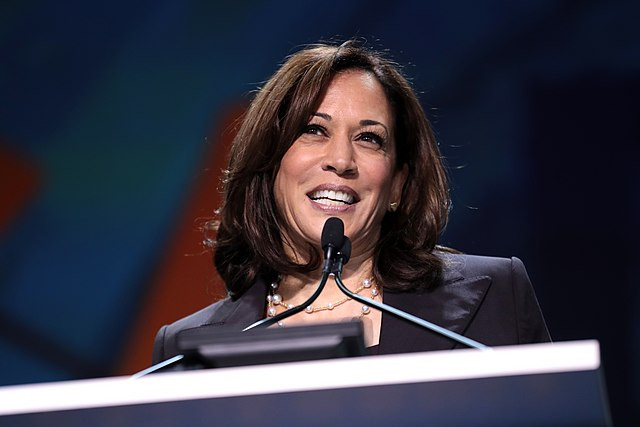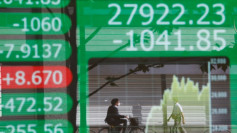Vice President Kamala Harris took a definitive step into the world of cryptocurrency and artificial intelligence (AI) during a high-profile fundraiser on Wall Street, signaling her openness to new technologies as part of her broader economic vision. At the event, which raised a record-breaking $27 million for her presidential campaign, Harris outlined her commitment to fostering innovation while protecting investors and consumers. The fundraiser, held at Cipriani Wall Street in New York, represents Harris's most direct engagement with the cryptocurrency sector and tech entrepreneurs as she aims to appeal to younger voters and business leaders.
"We will encourage innovative technologies like AI and digital assets while protecting our consumers and investors," Harris said, addressing a crowd of industry leaders, small business founders, and labor representatives. The event marks the first time Harris has made a public statement on cryptocurrency since launching her presidential campaign, a move that reflects her campaign's strategy to court a broader base of support, particularly among young men, a demographic that increasingly identifies with the Republican Party and embraces digital currencies.
Harris's rhetoric suggests she is keen on aligning herself with technological advances, positioning herself as a candidate capable of navigating both traditional economic frameworks and emerging sectors like AI and cryptocurrency. "I will bring together labor, small business founders, and innovators, and major companies," she promised the audience, vowing to "partner together to invest in America's competitiveness, to invest in America's future."
Her remarks come as former President Donald Trump has also leaned heavily into the crypto space, casting himself as the "crypto candidate." Trump's embrace of digital currencies has garnered him fervent support from a segment of single-issue voters and wealthy donors within the crypto community. During a recent two-hour livestream on X (formerly Twitter), Trump declared that he would position the United States as the "crypto capital of the planet," a significant shift from his earlier skepticism toward digital currencies. Trump's sons, both crypto enthusiasts, have even launched their own decentralized finance project, signaling the former president's deep ties to the sector.
The timing of Harris's crypto comments is crucial, as she tries to distinguish herself from Trump and appeal to a demographic increasingly disillusioned with traditional political narratives. Males aged 18 to 24 are now more likely than any other voter group to own cryptocurrencies, according to recent polling data, and many in that demographic have been aligning themselves with the Republican Party. Harris's overture to these voters, especially in the business sector, is seen as part of her broader strategy to compete with Trump's populist appeal while promising a more inclusive, forward-thinking economy.
Brian Nelson, a senior policy adviser for Harris's campaign, confirmed the importance of this shift, stating, "She's going to support policies that ensure that emerging technologies like cryptocurrency and AI can continue to grow." Nelson's comments echoed those made by Harris at the fundraiser, where she stressed the importance of creating a "safe business environment with consistent and transparent rules of the road."
Harris's focus on AI and cryptocurrency is a calculated response to Trump's overtures to Silicon Valley and crypto enthusiasts. Trump, who once dismissed Bitcoin, has since made a dramatic pivot, endorsing a range of policies designed to elevate the U.S. as a leader in digital assets. His calls for a national Bitcoin reserve and his criticism of the Securities and Exchange Commission (SEC) under Gary Gensler have positioned him as a pro-crypto candidate, further solidifying his base among tech entrepreneurs.
The significance of cryptocurrency in the 2024 election cannot be ignored, even though it may not be a decisive issue for the broader electorate, which remains focused on economic concerns, immigration, and global conflicts. Still, the crypto industry has invested heavily in the race, with political action committees like Fairshake-backed by Ripple, Coinbase, and Andreessen Horowitz-spending $119 million to influence the outcome. The financial backing of tech giants and crypto enthusiasts alike makes clear that this niche sector has a growing influence on national politics.
Harris's ability to navigate this landscape may prove critical as she competes against Trump for support from business leaders and tech-savvy young voters. While Trump has long courted high-profile tech figures like Tesla CEO Elon Musk and venture capitalists from Andreessen Horowitz, Harris's focus on a balanced approach-encouraging innovation while ensuring regulatory protections-could resonate with a broader swath of the electorate.
As the 2024 presidential race heats up, Harris's campaign has made it clear that appealing to business leaders and young, tech-forward voters will be key to her path to victory. Her campaign stops this week reflect that strategy, with upcoming visits to Arizona and Nevada, key battleground states in the race for 270 electoral votes. "The campaign believes that this travel reflects the many paths to 270 electoral votes that Vice President Harris has available-hitting both Blue Wall and Sun Belt states," a campaign official said.
In contrast, Trump will be in Savannah, Georgia, on Tuesday to discuss his economic plan, which focuses on lowering taxes for American business owners and promoting American-made goods. Both candidates' outreach to the business sector is shaping up to be a defining feature of the campaign, with crypto and AI emerging as unexpected but influential topics.
While Harris has traditionally focused on policies aimed at supporting low- and middle-income families, her latest remarks suggest a broader economic vision. In her comments, she also pledged to invest in semiconductors, clean energy, and other future-focused industries, and to slash "needless bureaucracy." These initiatives, combined with her embrace of AI and cryptocurrency, signal her intent to build an "opportunity economy," one where American innovation can thrive under a regulatory framework that balances growth with consumer protection.





